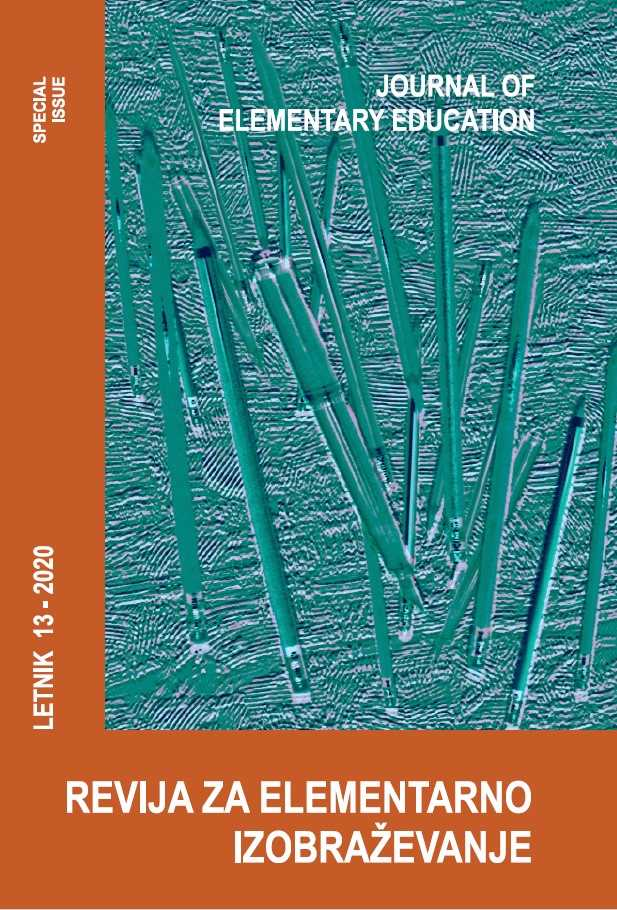Spremljanje na delovnem mestu kot učna izkušnja
Abstract
Job shadowing as learning experience. We present job shadowing as an activity through which we can enable an individual to gain insight into what work an individual performs in a particular job, while at the same time taking the individual’s experience as a starting point from which learning can emerge. The first part of the text presents the theoretical starting points for work-based learning and job shadowing; in the second part, we present the results of the analysis of students’ reflections after the shadowing experience. The findings show that students found job shadowing extremely positive, as well as an experience that encouraged them to reflect on issues related to different aspects of the profession. In conclusion, we discuss whether job shadowing is an activity appropriate for use in studies for teaching professions.
Downloads
References
Armstrong, E. K. (2003). Applications of role-playing in tourism management teaching: An evaluation of a learning method. Journal of Hospitality, Leisure, Sport & Tourism Education, 2(1), 5–16.
Biggerstaff, D., in Thompson, A. R. (2008). Interpretative Phenomenological Analysis (IPA): A Qualitative Methodology of Choice in Healthcare Research. Qualitative Research in Psychology, 5(3), 214–224. doi:10.1080/14780880802314304.
Bindal, T., in Goodyear, H. (2014). Newly qualified doctors’ views of their job shadowing experiences. British Journal of Hospital Medicine, 75(9), 528–532. doi:10.12968/hmed.2014.75.9.528.
Boud, D., in Garrick, J. (1999). Understanding learning at work. London: Routledge.
Brennan, J., in Little, B. (1996). A review of work-based learning in higher education. London: Department for Education and Employment.
Burke, L., Marks‐Maran, D. J., Ooms, A., Webb, M., in Cooper, D. (2009). Towards a pedagogy of work‐based learning: perceptions of work‐based learning in foundation degrees. Journal of Vocational Education & Training, 61(1), 15–33. DOI: 10.1080/13636820902819917.
Cedefop (2015). Work-based learning in continuing vocational education and training: policies and practices in Europe. Luxembourg: Publications Office of the European Union.
Creswell, J. W. (2007). Qualitative Inquiry and Research Design: Choosing Among Five Approaches. (2. izdaja). Thousand Oaks: Sage Publications.
Darling-Hammond, L. (2006). Constructing 21st century teacher education. Journal of Teacher Education, 57(3), 300–314.
Dewey, J. (1933). How we think: A restatement of the relation of reflective thinking to the educative process. Boston, itd.: Heath & Co.
Dewey, J. (1997). Experience & Education. New York: Touchstone.
Dretske, F. (1981). Knowledge and the Flow of Information. Cambridge, MA: MIT Press.
Eatough, V., in Smith, J. A. (2008). Interpretative Phenomenological Analysis. V: C. Willig in W. Stainton-Rogers (ur.) The Sage Handbook of Qualitative Research in Psychology (str. 179–194). Sage Publications.
European Commission (2018). Promoting adult learning in the workplace. Final report of the ET 2020 working group 2016 – 2018 on adult learning. Luxembourg: Publications Office of the European Union.
Govekar-Okoliš M., in Kranjčec R. (2018). Naloge mentorja v mentorstvu višješolskim študentom. Andragoška spoznanja, 24(3), 73–90. Pridobljeno https://doi.org/10.4312/as.24.3.73-90 (Dostopno 5. 4. 2020.)
Grimwood, B. S. R., Arthurs, W., in Vogel, T. (2015). Photo essays for experiential learning: Toward a critical pedagogy of place in tourism education. Journal of Teaching in Travel & Tourism, 15(4), 362–381.
Hamilton, M. A. in Hamilton, S. F. (1997). Learning Well at Work: Choices for Quality. National School-to-Work Opportunities Office, Washington, DC.; Cornell Univ., Ithaca, NY. Dept of Human Development and Family Studies.
Keevers, L., in S. Outhwaite. (2001). All in a day’s work: Investigating workplace learning in AOD work. V: A. M. Roche in J. McDonald (ur.), Systems, settings, people: Workforce development challenges for the alcohol and other drugs field, (str. 151–160). Adelaide, Australia: National Centre for Education and Training on Addiction.
Kolb, D. (2015). Experiential learning: Experience as the source of learning and development (2. izd.). Upper Saddle River, New Jersey: Pearson Education.
Job Shadowing Guidelines (b. l.). Human Resources Organisation Development Training & Diversity. Manchester Metropolitan University. Pridobljeno https://www2.mmu.ac.uk/media/m–muacuk/content/documents/human-resources/a-z/guidance-procedures-and-handbooks/Job_Shadowing_Guidelines.pdf (Dostopno 12. 9. 2019.)
Marentič Požarnik, B., Šarič, M., in Šteh, B. (2019). Izkustveno učenje. Ljubljana: Znanstvena založba Filozofske fakultete.
Maier, T. A., in Thomas, N. J. (2013). Hospitality leadership course design and delivery: A blended-experiential learning model. Journal of Hospitality & Tourism Education, 25(1), 11–21.
Oswald, R.G., Alderman, A. L., in Willmering, P. (2017). Short-Term Job Shadowing Experience Benefits for Undergraduate Rehabilitation Students. Australian Journal of Rehabilitation Counselling. 23(2),79–89.
Padron, T. C., Fortune, F., Spielman, M., in Tjoei, S. (2017). The job shadow assignment: career perceptions in hospitality, recreation and tourism. Research in Higher Education Journal, 32, 1–20.
Plut-Pregelj, L. (1999). John Dewey in učni načrt. Sodobna pedagogika, 50(3), 106–125.
Radovan, M. in Makovec, D. (2015). Relations between Students’ Motivation, and Perceptions of the Learning Environment. Center for Educational Policy Studies Journal, 5(2), 115–138.
Raelin, J. A. (1997). A model of Worked Based Learning (WBL). Organization science 8(6), 563–578.
Reese, S. (2005). Exploring the world of work through job shadowing. Techniques: Connecting Education and Careers, 80(2), 18–23.
Roles and Tasks of a Mentor (2018). Pridobljeno s https://www.uwb.edu/getattachment/prem–ajor/atp/faculty-and-staff-mentors/mentor-resources/ATP-Mentorship-Program-Roles-and-Tasks.pdf (Dostopno 20. 4. 2019.)
Ruhanen, L. (2005). Bridging the divide between theory and practice: Experiential learning approaches for tourism and hospitality management education. Journal of Teaching in Travel & Tourism, 5(4), 35–39.
Service, B., Dalgic, G. E., in Thornton, K. (2017). Benefits of a shadowing/mentoring intervention for New Zealand school principals. Professional Development in Education, 44(4), 507–520. DOI:10.1080/19415257.2017.1378705.
Shortt, G. B. (1987). A case study of the relationship between cognitive style and experiential learning in hospitality management education. Journal of Hospitality & Tourism Research, 11(1), 1–18.
Smith, J.A., Flowers, P., in Larkin, M. (2009). Interpretive phenomenological analysis: Theory, method, and research. London: Sage.
Vovk Korže, A., Vihar, N., in Nekrep, A. (2007). Partnerstvo fakultet in šol kot spodbuda profesionalnemu razvoju učiteljev. Maribor: Pedagoška fakulteta.
Wilks, J., in Ross, K. (2014). Shadowing, »The Most Valuable Thing You Can Do«: Threading Informal Classroom Experiences into Secondary Pre-Service Teacher Education. Teacher Education Quarterly, 41(2), 93–106.
Copyright (c) 2020 Danijela Makovec

This work is licensed under a Creative Commons Attribution 4.0 International License.
